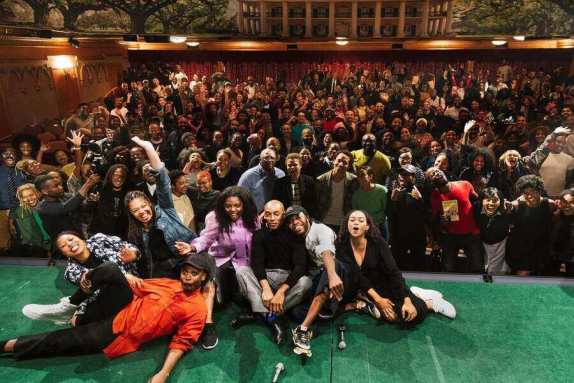Jeremy O. Harris (second from right) at the Black Out night performance of “Slave Play” on Broadway.
What does it take for Black audiences to feel at home in the theatre? This question looms over producers at predominantly white institutions as they hope to encourage people to return to the theatre following Covid-19’s shuttering impact. Playwrights Dominique Morisseau and Jeremy O. Harris have been at the helm of a grassroots movement with a promising answer: Black Out nights.
In 2017, when Morisseau’s play Pipeline was heading to Lincoln Center Theater, the cast expressed discomfort at performing “in-the-house stuff”—material that specifically speaks to the Black experience—“in front of Lincoln Center’s very white audience.” Because of the play’s references to the school-to-prison pipeline and the adultification of Black children, they requested assurance that the systemic disparities centered in Pipeline would not be reflected in who had access to sit in the audience. “I promised them that would not be what they see every time they look out in the house,” Morisseau recalls.
Much has been written about the ways Black audience members’ behaviors have been policed in the theatre, from criticizing their hair to discouraging vocal call-and-response. Morisseau’s husband, J. Keys, suggested that she create something called Black Theatre Night to foster the sense of church, a family reunion, and other spaces where Black audiences felt wholly welcome. Tapping into her network, Morisseau sent emails for multiple affinity nights, including ones for Asian, Latine, and young audiences, with varying levels of success. “I was trying to prove something to Lincoln Center at that time about, if you go to the people they’ll come, you know, and everybody has an audience,” Morisseau said.
When Harris’s provocative Slave Play hit Broadway in 2019, he had a similar mission, and more resources. With groundbreaking success, the show’s producers filled 804 seats of Broadway’s Golden Theatre with an all-Black-identifying audience Harris dubbed Black Out Nite. The full houses offered a hopeful solution to what the production’s dramaturg, Amauta Marston-Firmino, described as “a real scarcity problem in the American theatre that creates a level of gate-keeping that keeps artists and audiences away.” Harris successfully repeated this model when Slave Play had its L.A. premiere at Center Theatre Group.
Now Black Out performances are filling houses across the country. At Atlanta’s Actor’s Express, associate artistic director Amanda Washington hosted one for her production of Erika Dickerson-Despenza’s cullud wattah. “In order to be inclusive, I have to be exclusive,” Washington explained. She’s planning another in June for the theatre’s production of Pearl Cleage’s Blues for an Alabama Sky. Morisseau planned two for her run of Sunset Baby at Signature Theatre in New York earlier this year. But she wants producers to understand that hosting a Black Out night is a step, not the end goal, which should be to support Black-led theatres.
“Don’t disrupt white American theatre by diversifying audiences and turn a blind eye to Black theatre,” Morisseau says. “You do not have to be in the binary of choosing.”
Dalyla Nicole (she/her) is an Atlanta-based playwright and dramaturg.


